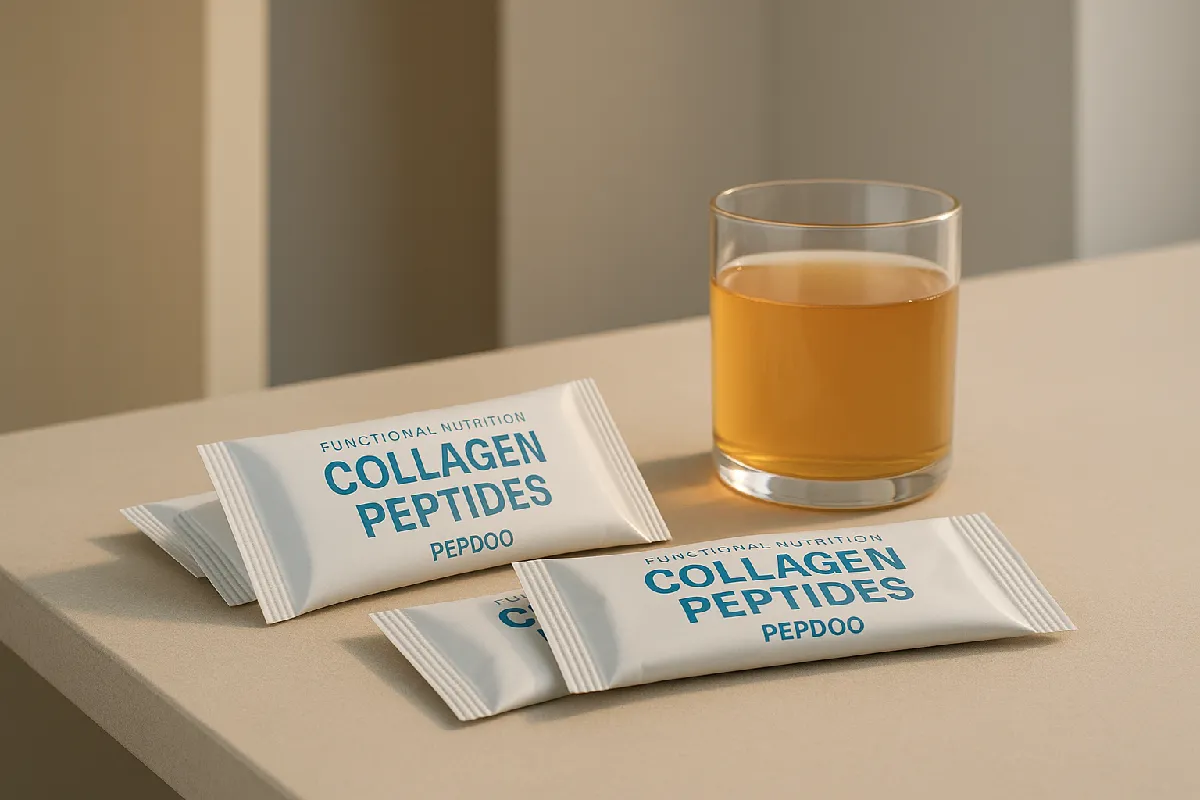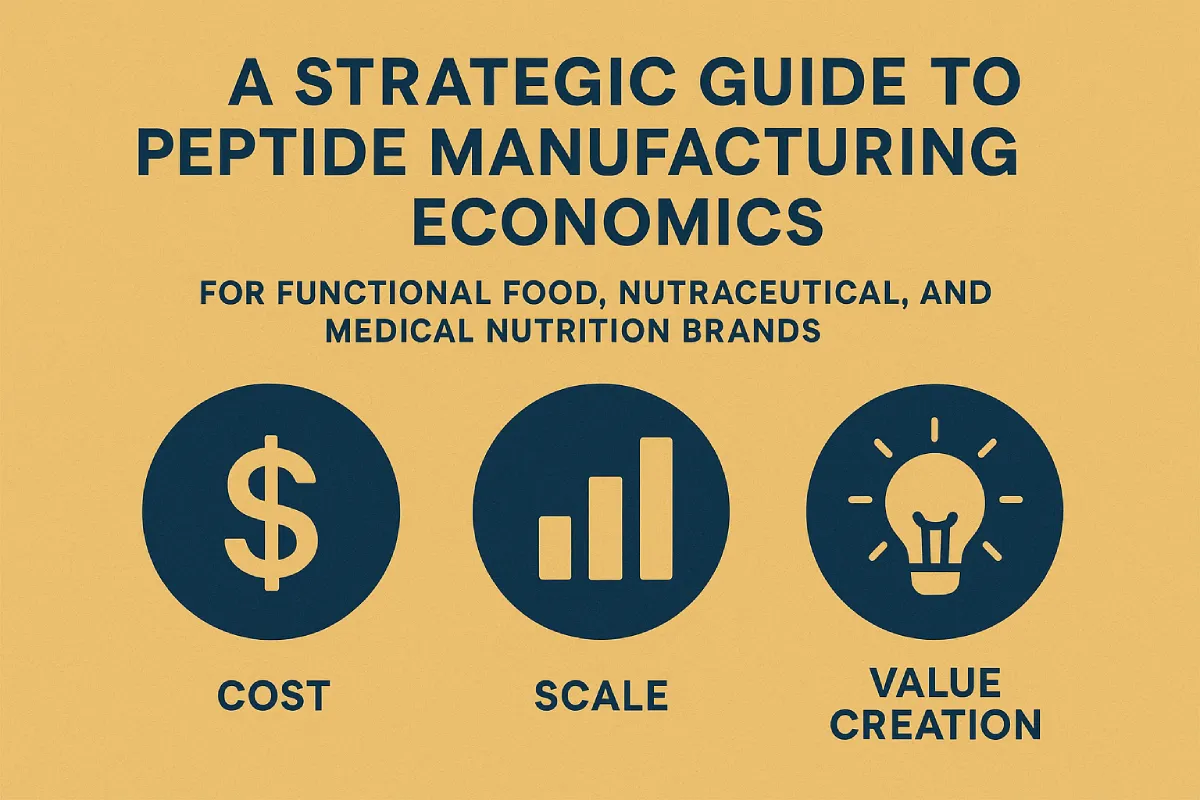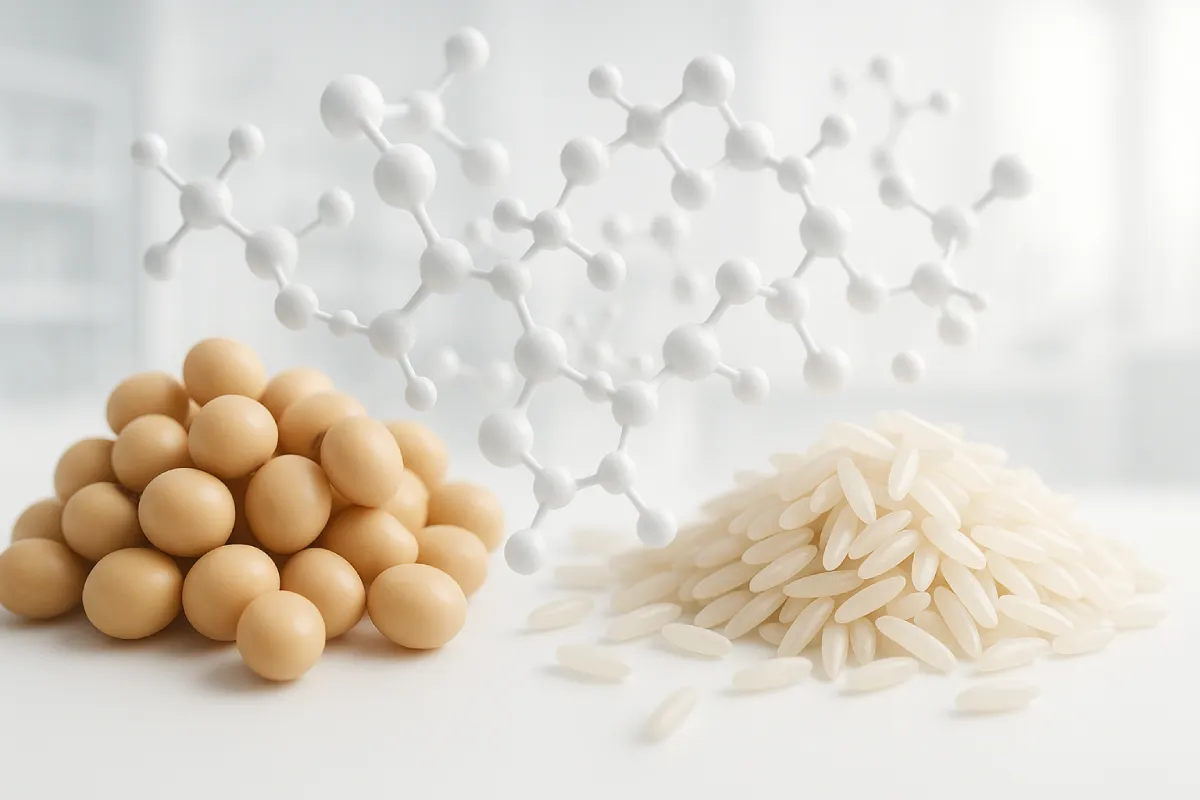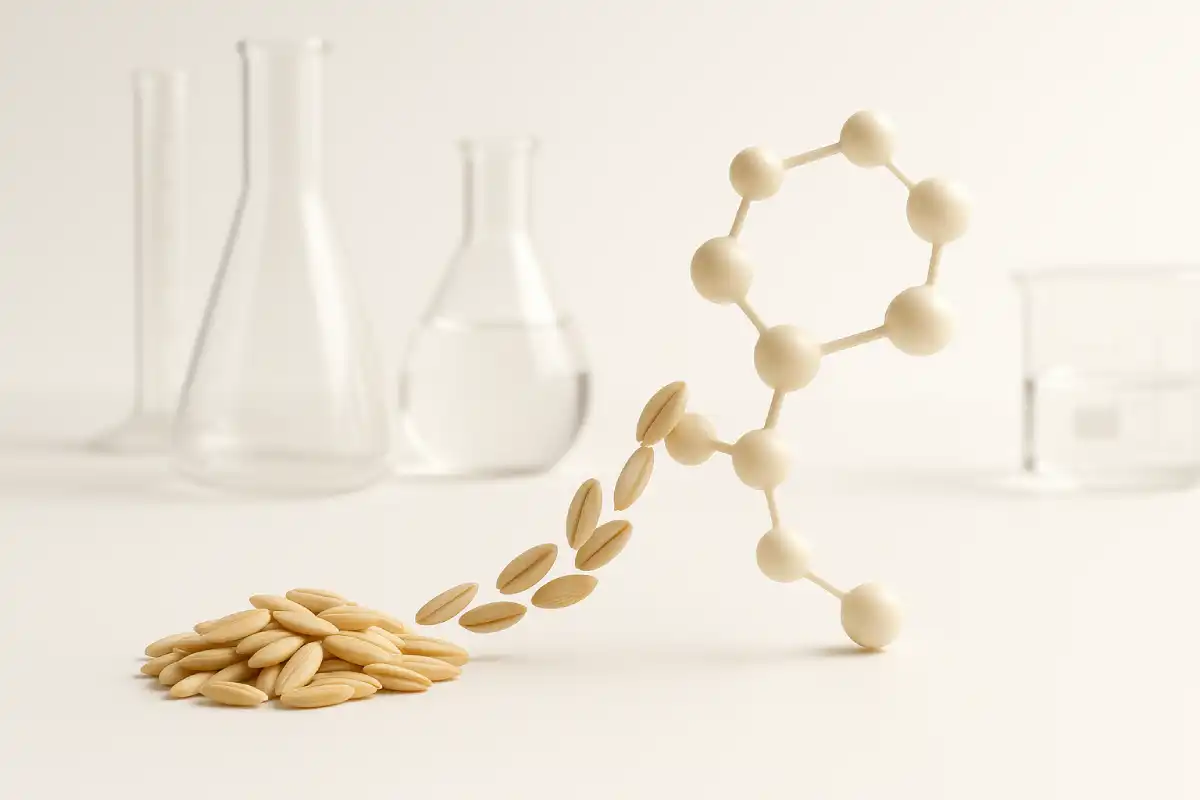Fermented Peanut Peptides: Anti-Inflammatory Innovation for Functional Nutrition
In the fast-evolving landscape of functional nutrition, brands and R&D teams are continuously on the lookout for novel bioactive ingredients that offer differentiating health benefits. One emerging star is fermented peanut peptides—small molecular peptides derived from peanut protein through controlled enzymatic and microbial fermentation. These ingredients combine the nutritional richness of peanuts with enhanced bioactivity, particularly anti-inflammatory potential.
For brands and manufacturers in functional foods, dietary supplements, and medical nutrition, adopting fermented peanut peptides offers a dual opportunity: product differentiation and scientifically validated health claims. As a full-spectrum peptide manufacturer, PEPDOO® leads as a source supplier with top-tier patents in China, having helped define China’s industry standards for functional peptides. With its advanced fermentation and peptide technologies, PEPDOO® is uniquely positioned to support brand partners from concept to commercialization.
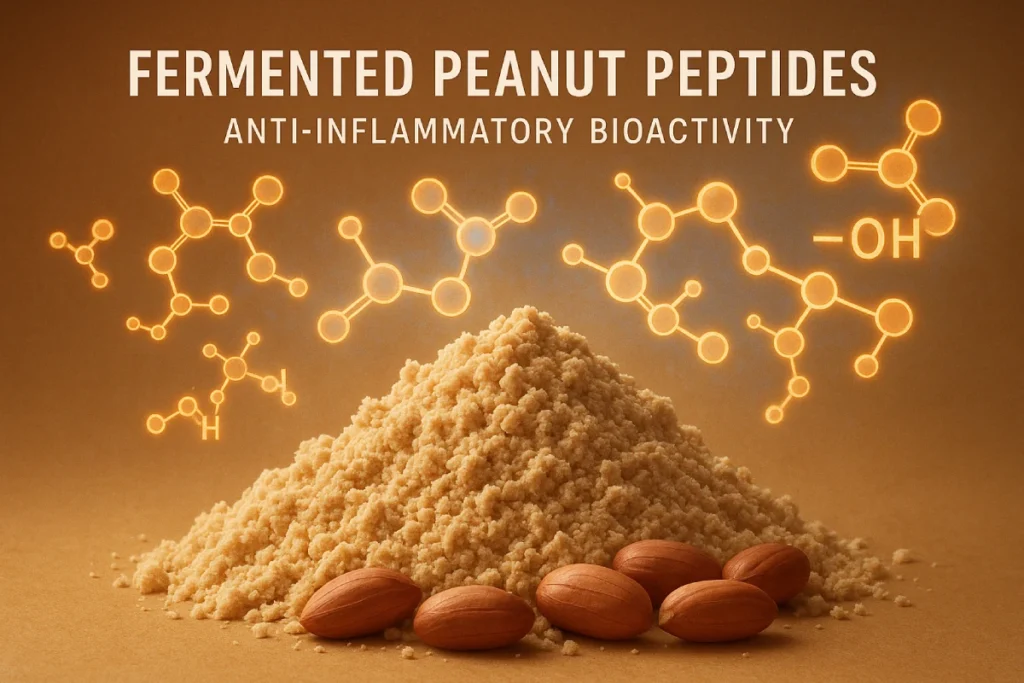
What Makes Fermented Peanut Peptides Unique?
Peanut (Arachis hypogaea) is already recognized as a high-quality plant protein source, rich in essential amino acids, phytochemicals (e.g., polyphenols, flavonoids), and micronutrients [14]. However, in intact peanut protein or standard hydrolysates, many functional sites remain latent or inaccessible. Fermentation adds a powerful layer of biotransformation:
- Dual-stage process: First, targeted enzymatic hydrolysis breaks down peanut protein into oligopeptides. Then, specific microbial strains (e.g., Bacillus, Lactobacillus, Rhizopus) ferment the hydrolysate, further trimming peptides and generating new bioactive sequences.
- Enhanced bioavailability: The fermentation step can reduce allergenic epitopes and degrade antinutritional factors, while increasing the proportion of small peptides (often <1,000 Da) that are more readily absorbed. In peanut meal fermentation experiments, acid-soluble protein and small-peptide content increased significantly post-fermentation [12].
- Emergent functional sequences: The fermentation microbiota may catalyze peptide bond rearrangements or cleavage, releasing cryptic peptide fragments with bioactive potential. Studies of fermented peanut flour by Rhizopus oryzae revealed previously undetected low-molecular-weight peptides by MS profiling [0search0].
- Controlled functionalization: Because PEPDOO® has proprietary fermentation and peptide purification technologies, we can modulate degree of hydrolysis, select microbial strain combinations, and purify specific peptide fractions—yielding ingredient forms with tailored molecular weight ranges and bioactivity profiles.
Because of these features, fermented peanut peptides transcend mere “plant protein hydrolysate” status—they are functional peptides with bioactive potential for health-driven applications.
Evidence-Based Anti-Inflammatory Mechanisms
Molecular Pathways & Preclinical Evidence
Inflammation is central to many chronic conditions (e.g. metabolic disease, arthritis, gut disorders). Natural bioactive peptides are emerging as modulators of inflammatory signaling. A review of plant-derived anti-inflammatory peptides outlines mechanisms including inhibition of NF-κB, MAPK, and JAK/STAT pathways, and suppression of pro-inflammatory cytokines like IL-6 and TNF-α [4].
Although direct studies on fermented peanut peptides are still nascent, proximal evidence supports their plausibility. For instance:
- Peanut meal extracts fermented with Bacillus natto attenuated physiological and behavioral deficits in an aging rat model, suggesting anti-inflammatory and antioxidative effects [18].
- Solid-state fermentation of peanut meal enhanced flavonoid content and improved anti-inflammatory and disease-resistance capabilities in animal models [12].
- General literature on fermented plant foods underscores how fermentation enhances immunomodulatory and anti-inflammatory bioactivity via both microbial metabolites and released peptides [16].
At a mechanistic level, fermented peanut peptides could:
- Scavenge reactive oxygen species (ROS), thereby reducing oxidative stress–triggered inflammatory cascades.
- Inhibit pro-inflammatory enzyme systems such as COX-2 or iNOS via peptide binding or competitive inhibition.
- Modulate gut immunity by favorably influencing microbiota or interacting with intestinal epithelial cell receptors, reducing local inflammation spillover.
- Suppress cytokine expression (e.g., lowering IL-1β, IL-6, TNF-α) through downregulation of NF-κB nuclear translocation.
Taken together, the biochemical plausibility, allied fermented plant food literature, and preliminary animal models support the concept that fermented peanut peptides may offer tangible anti-inflammatory effects worthy of further validation.
Beyond Inflammation: Antioxidant, Immune & Metabolic Support
Fermented peanut peptides are not a one-trick pony. They carry multi-dimensional functionality, which is especially attractive for B2B brands seeking to build broad-spectrum formulations.
Antioxidant Activity
Fermented peanut substrates show enhanced antioxidant performance compared with unfermented controls. In studies evaluating antioxidant, anti-glycation, and bile acid-lowering properties, fermented peanut meal fractions scored higher radical scavenging capacity and lower glycation products [6]. This antioxidant synergy can help buffer oxidative stress, a key driver of chronic inflammation.
Immune Modulation
By combining fermentation-derived metabolites (e.g. short-chain peptides, organic acids) with bioactive peptides, fermented plant matrices often deliver immunomodulatory benefits, influencing both innate and adaptive responses [16]. In brand formulations, this opens potential for immune-support products with combined anti-inflammatory + immunoregulatory claims.
Metabolic & Gut Health Support
Emerging research links certain bioactive peptides to improved glucose metabolism, lipid regulation, and gut barrier integrity. Because peanuts are naturally rich in micronutrients like niacin, vitamin E, and phytochemicals [14], the peptide fractions from fermented peanut may carry co-benefits beyond pure peptide activity. Moreover, when combined with other plant-derived peptides or prebiotic carbohydrates, they offer synergistic value in metabolic nutrition formulas.
Given PEPDOO®’s full-range peptide capability, clients can combine fermented peanut peptides with other peptides (e.g. soy peptide, oyster peptide, collagen tri-peptides) to yield multi-functional blends that target synergistic pathways and enhance product differentiation.
Innovative Applications in Functional Foods, Supplements & Medical Nutrition
For B2B brands, the true value of fermented peanut peptides lies in their adaptability across product forms. Below are typical application scenarios.
Functional Beverages & Nutrition Drinks
Peptide solubility and stability make fermented peanut peptides well-suited for ready-to-drink (RTD) or powdered beverages (mixed with water). They can be positioned as inflammation-supporting “recovery” formulations in sports or wellness beverages.
Nutritional Bars, Snacks & Powders
Because of good mixability and flavor masking techniques, brands can incorporate fermented peanut peptide powder into bars, shakes, or snack matrices. It can also drive messaging on “plant-based peptide + anti-inflammatory support.”
Capsules, Tablets & Softgels
For nutraceutical or dietary supplement formats, fermented peanut peptide extracts or concentrated fractions can be encapsulated. They may pair well with micronutrients (e.g. vitamin D, omega-3) or botanical ingredients in joint-health, metabolic support, or immune categories.
Medical Nutrition & Special Diets
In pathophysiological conditions where inflammation is a concern (e.g. IBS, IBD, metabolic syndrome), fermented peanut peptides may be considered as adjunct functional ingredients in clinical nutrition formulas—pending safety and regulatory validation.
Case Example: Sports Nutrition Bar
A European sports nutrition brand partnered with PEPDOO® to incorporate fermented peanut peptide into a high-protein bar. After launch, the product achieved strong uptake in the direct-to-consumer channel, with reported 20% uplift in repeat purchase within three months in a moderate market.
Case Example: Anti‑Inflammatory Dietary Supplement
A regional supplement brand in Southeast Asia used PEPDOO®’s fermented peanut peptide in a softgel formula targeting joint comfort and metabolic inflammation. Within six months of launch, the brand expanded distribution from local wellness stores to a national pharmacy chain.
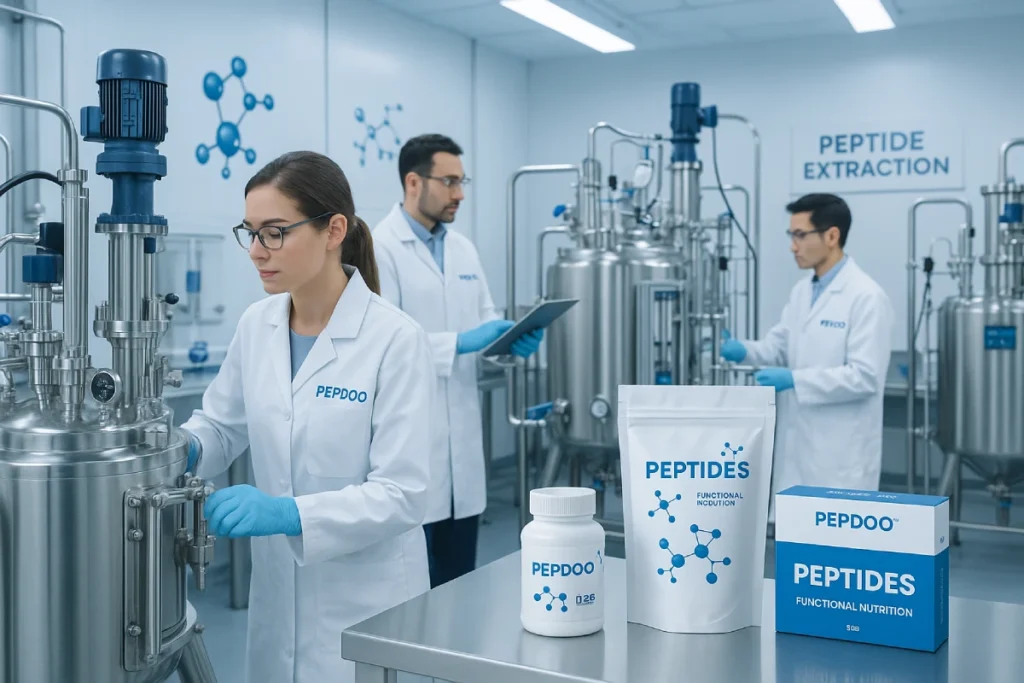
PEPDOO® – Patented, Full-Range Peptide Manufacturing for Global Brands
When your brand sources fermented peanut peptides, alignment with a dependable manufacturer is critical. That’s where PEPDOO® distinguishes itself:
- We are a full-spectrum peptide manufacturer, offering not only fermented peanut peptides but an entire line of plant-derived and marine peptides (e.g. soy peptide, oyster peptide, collagen peptides). This enables clients to design multi-peptide formulations seamlessly in one ecosystem.
- As a China-based industry standard setter, PEPDOO® is actively involved in developing China’s category peptide norms and regulatory alignment.
- Our patent portfolio ranks among the top in small-molecule peptide innovation within China, giving us freedom-to-operate and differentiation benefits.
- We possess leading-edge fermentation + peptide synthesis & purification technologies, comparable to global benchmarks, with continuous investment in R&D and scale-up capabilities.
- We support custom development, sample provision, technical dossiers, and regulatory consultation, making us a turnkey partner for brands and R&D teams.
Assured Quality, Safety & Regulatory Compliance
- GMP / ISO / HACCP Systems – Our facilities are certified to international standards, ensuring consistent process control, hygiene, and traceability.
- Third-party and in-house testing – Every batch is tested for peptide purity, heavy metals, microbial limits, allergenicity, and functionality.
- Traceability & lot records – From raw peanut sources to fermentation strains to final peptide lots, full traceability ensures audit readiness.
- Global regulatory alignment – We supply clients across Asia, Europe, and North America. We align documentation with health claims guidelines (e.g. Novel Food, DSHEA, CNF) and can assist in claim validation studies.
- Risk mitigation – Because we hold multiple peptide patents and maintain proprietary process know-how, clients avoid downstream IP entanglement.
From Concept to Market: Successful Product Models
To illustrate the lifecycle, here is an idealized path:
- Concept Phase: Using PEPDOO®’s technical team, a brand defines target dosage (e.g. 300 mg fermented peanut peptide daily) and co-ingredients (e.g. curcumin, resveratrol).
- R&D & Formulation: PEPDOO® supplies sample peptides, performs solubility/stability screening, and advises excipient compatibility.
- Pilot Production & Testing: Small pilot batches are sent for accelerated stability, dissolution, and bioactivity assays (e.g. anti-inflammatory marker suppression in cell lines or small animals).
- Scale-up & GMP Manufacturing: Transition from pilot to full GMP manufacturing with process validation and QA release.
- Regulatory & Claim Filing: PEPDOO® supports dossier creation, safety data submission, and helps the brand with claim substantiation.
- Launch & Post-market Support: Brands market the product with messaging such as “Plant‑derived fermented peanut peptide with demonstrated anti‑inflammatory peptides, developed with PEPDOO®,” boosting confidence among procurement, regulatory, and marketing stakeholders.
Partner with PEPDOO® to Unlock the Potential of Fermented Peanut Peptides
Fermented peanut peptides represent a compelling frontier in functional nutrition—offering anti-inflammatory, antioxidant, immune, and metabolic benefits in a plant-based, scalable form. As a B2B brand, your differentiator lies in adopting high-quality, scientifically backed ingredients and aligning with a trusted supplier.
By partnering with PEPDOO®, you gain:
- Access to a leading full-range peptide supplier
- Confidence in patent-backed, industry-standard technologies
- Turnkey support across R&D, regulatory, and scale-up
- Differentiation leverage through validated health claims
Take the next step: request samples, view technical dossiers, or discuss custom formulation pathways with us. Let’s bring fermented peanut peptide–infused innovations from concept to market success.
Partner with PEPDOO® for Fermented Peanut Peptide Innovation
Access our patented, full-range peptide solutions and bring anti-inflammatory functional nutrition products to market efficiently. Get technical support, custom formulation, and regulatory guidance from concept to commercialization.
Request Samples & ConsultationFAQ
PEPDOO® offers fermented peanut peptides in multiple formats: fine powders, concentrated extracts, and pre-formulated blends. Our peptides are standardized by molecular weight (typically <1,000 Da) to ensure high bioavailability and consistent functional performance.
Depending on application (beverages, capsules, nutrition bars), effective peptide inclusion can range from 100–500 mg per serving. Our technical team can advise optimal inclusion levels based on functional claims, flavor, solubility, and regulatory requirements.
Yes. They are highly compatible with plant peptides (soy, pea), marine peptides (collagen, oyster), botanical extracts, vitamins, and minerals. PEPDOO® supports multi-peptide and multi-ingredient formulation design to achieve synergistic health benefits.
Peanuts are naturally allergenic; however, our controlled enzymatic hydrolysis and fermentation process significantly reduce allergenic epitopes. We provide detailed allergen testing and documentation for regulatory compliance.
All batches are manufactured in GMP, ISO, and HACCP-certified facilities. Each lot is tested for peptide purity, microbial limits, heavy metals, and functionality. PEPDOO® also assists with documentation for global regulatory compliance, including Novel Food, DSHEA, and CNF guidelines.
Absolutely. PEPDOO® provides end-to-end support: custom peptide fractionation, formulation guidance, sample provision, pilot scale-up, and technical dossiers. This enables brands to bring differentiated functional nutrition products to market efficiently.
Preclinical studies and peer-reviewed literature indicate that fermented peanut peptides can modulate inflammatory pathways, including NF-κB inhibition and suppression of pro-inflammatory cytokines (IL-6, TNF-α) [1][2]. PEPDOO® can provide in vitro and in vivo data for B2B technical review.
They are suitable for incorporation into clinical or special diet products where inflammation management is relevant, such as metabolic syndrome, gut health, or joint support formulas. Safety, dosage, and regulatory guidance should be consulted on a case-by-case basis.
Standard lead times vary by order size and formulation complexity, typically 4–8 weeks for bulk supply. PEPDOO® can accommodate urgent projects via stock and pilot-scale preparation for smaller batches.
PEPDOO® offers multi-language technical documentation, sample shipping, formulation advisory, and regulatory guidance. Our patent-backed, full-range peptide manufacturing capabilities ensure consistent quality for export-ready products in Asia, Europe, and North America.
References
- Ortiz, C., & Martirosyan, D. M. (2024). Bioactive compounds in peanuts (Arachis hypogaea L.): a review of their anti‑inflammatory and antioxidant effects. Agriculture and Food Bioactive Compounds, 1(12), 1–18.
- Shahbazi, R., Sharifzad, F., Bagheri, R., Alsadi, N., Yasavoli‑Sharahi, H., & Matar, C. (2021). Anti‑Inflammatory and Immunomodulatory Properties of Fermented Plant Foods. Nutrients, 13(5), 1516. https://doi.org/10.3390/nu13051516
- *Peanut meal extract fermented with Bacillus natto attenuates physiological and behavioural deficits in a d-galactose–induced ageing rat model*. British Journal of Nutrition.
- *Anti‑Inflammatory Function of Plant‑Derived Bioactive Peptides*. PMC.
- *Research Advances in the High‑Value Utilization of Peanut Meal*. MDPI.
- *In vitro antioxidant, anti‑glycation, and bile acid-lowering capacity of fermented peanut meal*.
- *Improving nutritional quality and aflatoxin detoxification of peanut meal via fermentation*.


